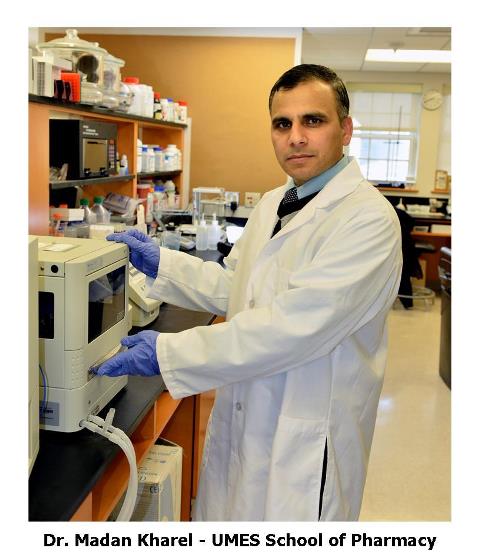Tuesday, January 27, 2015

PRINCESS ANNE, MD – (Jan. 27, 2015) – “The struggle” to overcome drug-resistant bacteria in the vernacular of today’s college student “is real,” and a University of Maryland Eastern Shore pharmacy professor is about to try his hand at solving that vexing health care challenge.
Dr. Madan Kharel won a “New Investigator Award” worth $10,000 from the American Association of Colleges of Pharmacy to launch his search for new medications he hopes can replace antibiotics rendered ineffective by new strains of bacteria.
“I know the issue,” Kharel said. “I know the challenge.”
Research into antibiotic-resistant bacteria is also emerging as a priority of President Obama’s administration, according to this Washington Post article .
Kharel is UMES’ second School of Pharmacy faculty member in as many years to receive a research grant from AACP. His across-the-hall colleague, Dr. Patrice Jackson-Ayotunde, received a grant in 2014 to support her work researching new medications to treat epilepsy.
The association has long supported a program that “provides start-up funding for new pharmacy faculty’s research programs.”
Kharel, who joined UMES’ faculty in 2013, was one of 15 collegiate educators selected this year to receive seed funding for new research initiatives.
“We’re investing in the scientists. We see potential,” said Kirsten F. Block, AACP’s associate director of research and graduate programs. “We want to give them the push to that big grant down the road.”
Dr. Victor Hsia, a faculty colleague, said Kharel’s “accomplishment … puts UMES on the national stage of pharmaceutical research. Winning this award for the second straight year shows the scholarly commitment of our faculty.”
UMES pharmacy students will benefit being around a faculty-researcher who will be working on the front lines of shaping new classes of medicine that someday they will dispense.
“It’s wonderful he is receiving this recognition,” said Cynthia Boyle, interim dean of UMES’ pharmacy school. “It is unprecedented for a new school of pharmacy to have faculty members designated as new investigators in successive years.”
Kharel toiled almost a dozen years in a University of Kentucky research lab, where he utilized his training in biochemistry and molecular biology to work on antibiotic research.
When offered a faculty position in UMES’ upstart pharmacy program, he saw the move as a way to teach and forge a new path where he could take the lead in research into health care challenges.
“That has been my dream,” Kharel said, “… to be an independent faculty member doing research.”
Officially, Kharel’s winning grant application was called “Rational Design of Thiopeptide Antibiotics through Biosynthetic Pathway Engineering.”
One strain of bacteria on his radar is Methicillin-Resistant Staphylococcus Aureus, better known as “MRSA.” The acronym strikes fear in those diagnosed with the infection and the health care professionals who treat it.
“Bacteria are growing more and more resistant to antibiotics,” he said. “The challenge we are facing is: ‘How do we bridge the gap?’.”
Theories abound in the lab and on paper on how to design new treatments, but finding practical, safe applications that make complex molecules in new medication safe to treat a sick human – or mammal – is a daunting and time-consuming task.
Large pharmaceutical companies are increasingly moving away from exclusive reliance on in-house research to develop new drugs, particularly new antibiotics, so higher education researchers are filling the void.
Kharel is anxious and excited to become part of that trend.
“Finding the pathway to synthesize these compounds and make them effective is possible, but,” he noted, “it is very, very difficult.”
“I’m looking forward to seeing if some of the ideas I have might work,” he said.
Bill Robinson , director, Office of Public Relations; (410) 621-2355

